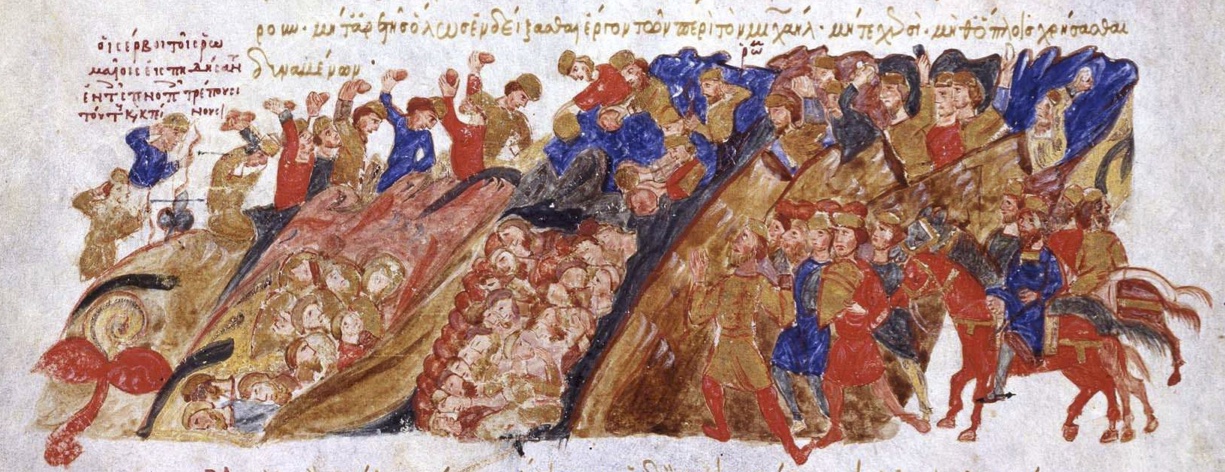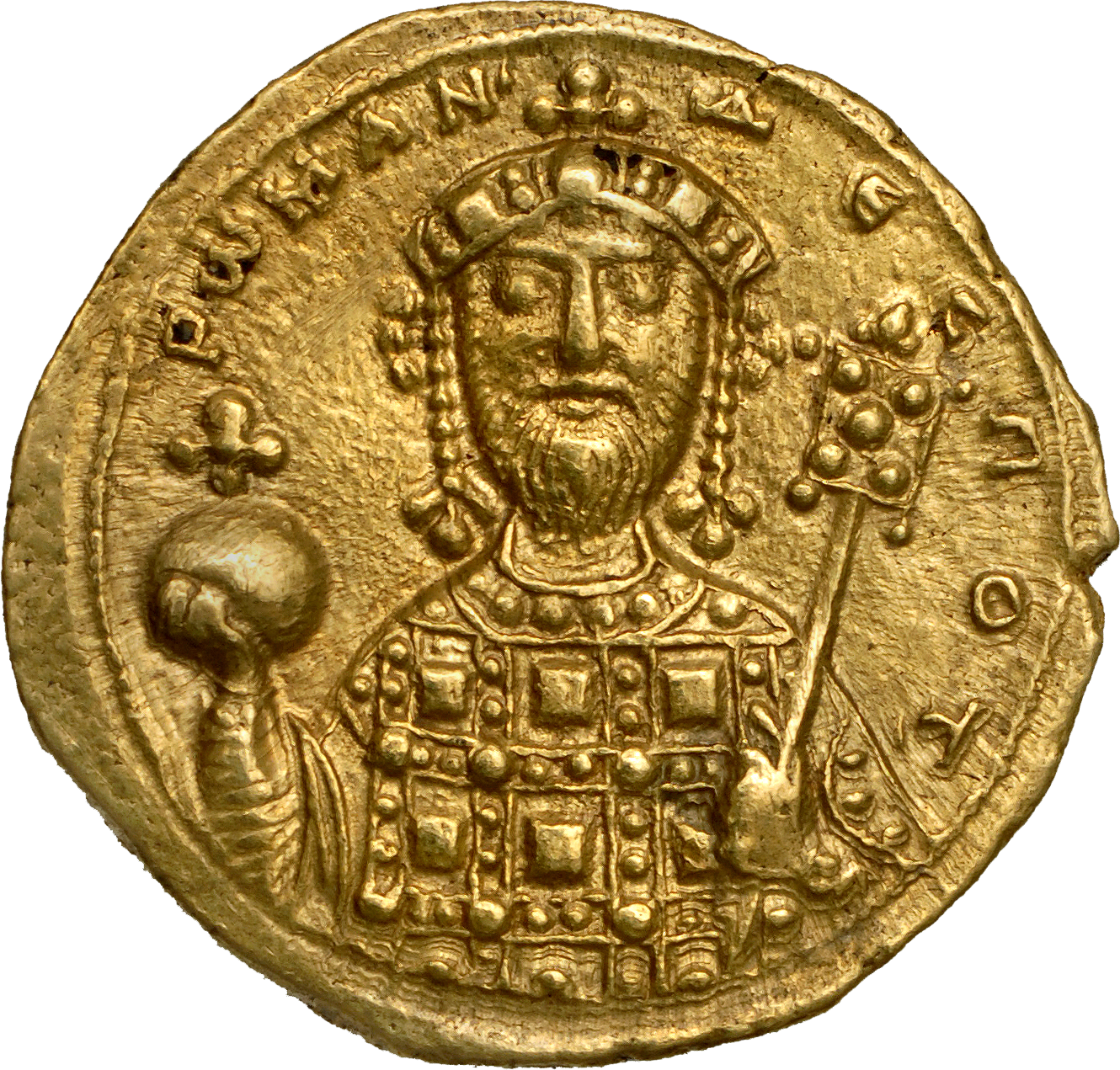|
Michael IV The Paphlagonian
Michael IV the Paphlagonian ( el, , ''Mikhaēl ho Paphlagōn''; c. 1010 – 10 December 1041) was Byzantine Emperor from 11 April 1034 to his death on 10 December 1041. The son of a peasant, Michael worked as a money changer until he was found a job at court by his brother John the Orphanotrophos. He caught the eye of the empress Zoë Porphyrogenita and they began a tempestuous and flagrant affair. It is believed that they conspired to murder her husband, Emperor Romanos III Argyros, who died in 1034. Michael and Zoë were married the same day and Michael was crowned emperor the day after. Michael, handsome and energetic, had poor health and entrusted most of the business of government to his brother. He distrusted Zoë and went to lengths to ensure that he did not suffer the same fate as his predecessor. The fortunes of the Empire under Michael's reign were mixed. His most triumphant moment came in 1041 when he led the imperial army against Bulgarian rebels. He returned fro ... [...More Info...] [...Related Items...] OR: [Wikipedia] [Google] [Baidu] |
Madrid Skylitzes
The ''Madrid Skylitzes'' is a richly illustrated illuminated manuscript of the ''Synopsis of Histories'' ( el, Σύνοψις Ἱστοριῶν, ), by John Skylitzes, which covers the reigns of the Byzantine emperors from the death of Nicephorus I in 811 to the deposition of Michael VI in 1057. The manuscript was produced in Sicily in the 12th century, and is now at the Biblioteca Nacional de España in Madrid, with the shelfmark MS Graecus Vitr. 26–2. Other names for it are and . Apart from the very fragmentary 6th-century Alexandrian World Chronicle, it is the only surviving illustrated manuscript of a Greek chronicle, and includes 574 miniatures. It is unclear whether these illustrations are copies of earlier Byzantine images or were newly created specifically for this copy. Bibliography * Color facsimile edition by Militos (Μίλητος) Publishers, . * Vasiliki Tsamakda, The Illustrated Chronicle of Ioannes Skylitzes, Leiden 2002. * Bente Bjørnholt and J. Burke ... [...More Info...] [...Related Items...] OR: [Wikipedia] [Google] [Baidu] |
Greeks
The Greeks or Hellenes (; el, Έλληνες, ''Éllines'' ) are an ethnic group and nation indigenous to the Eastern Mediterranean and the Black Sea regions, namely Greece, Greek Cypriots, Cyprus, Greeks in Albania, Albania, Greeks in Italy, Italy, Greeks in Turkey#History, Turkey, Greeks in Egypt, Egypt, and, to a lesser extent, other countries surrounding the Mediterranean Sea. They also form a significant Greek diaspora, diaspora (), with Greek communities established around the world.. Greek colonies and communities have been historically established on the shores of the Mediterranean Sea and Black Sea, but the Greek people themselves have always been centered on the Aegean Sea, Aegean and Ionian Sea, Ionian seas, where the Greek language has been spoken since the Bronze Age.. Until the early 20th century, Greeks were distributed between the Greek peninsula, the western coast of Asia Minor, the Black Sea coast, Cappadocia in central Anatolia, Egypt, the Balkans, Cyprus, an ... [...More Info...] [...Related Items...] OR: [Wikipedia] [Google] [Baidu] |
Michael IV And His Men In Front Of The Bulgarian Barricade
Michael may refer to: People * Michael (given name), a given name * Michael (surname), including a list of people with the surname Michael Given name "Michael" * Michael (archangel) Michael (; he, מִיכָאֵל, lit=Who is like El od, translit=Mīḵāʾēl; el, Μιχαήλ, translit=Mikhaḗl; la, Michahel; ar, ميخائيل ، مِيكَالَ ، ميكائيل, translit=Mīkāʾīl, Mīkāl, Mīkhāʾīl), also ..., ''first'' of God's archangels in the Jewish, Christian and Islamic religions * Michael (bishop elect), English 13th-century Bishop of Hereford elect * Michael (Khoroshy) (1885–1977), cleric of the Ukrainian Orthodox Church of Canada * Michael Donnellan (fashion designer), Michael Donnellan (1915–1985), Irish-born London fashion designer, often referred to simply as "Michael" * Michael (footballer, born 1982), Brazilian footballer * Michael (footballer, born 1983), Brazilian footballer * Michael (footballer, born 1993), Brazilian footballer ... [...More Info...] [...Related Items...] OR: [Wikipedia] [Google] [Baidu] |
The Wedding Of Zoe And Michael The Paphlagonian
''The'' () is a grammatical article in English, denoting persons or things that are already or about to be mentioned, under discussion, implied or otherwise presumed familiar to listeners, readers, or speakers. It is the definite article in English. ''The'' is the most frequently used word in the English language; studies and analyses of texts have found it to account for seven percent of all printed English-language words. It is derived from gendered articles in Old English which combined in Middle English and now has a single form used with nouns of any gender. The word can be used with both singular and plural nouns, and with a noun that starts with any letter. This is different from many other languages, which have different forms of the definite article for different genders or numbers. Pronunciation In most dialects, "the" is pronounced as (with the voiced dental fricative followed by a schwa) when followed by a consonant sound, and as (homophone of the archaic ... [...More Info...] [...Related Items...] OR: [Wikipedia] [Google] [Baidu] |
Alexius I Of Constantinople
Alexios Stoudites or Alexius Studites ( el, Ἀλέξιος ὁ Στουδίτης) (? – 20 February 1043), an ecumenical patriarch of Constantinople, was a member of the Monastery of Stoudios (founded 462), succeeded Eusthathius as patriarch in 1025, the last of the patriarchs appointed by Emperor Basil II. Patriarchate Alexius set out to reform the church institution of the '' charistike dorea'' (donation), which recent research dates to the period just after the Triumph of Orthodoxy (843). Effectively, it involved the donation of monasteries to private individuals unrelated to the establishments founders, for a limited period of time. Ostensibly undertaken so that the monastery buildings could be repaired or conserved and the estate out to good use, while at the same time protecting and preserving its spiritual functions, in actuality it was widely abused by the landed gentry and so became a source of abused patronage by high church officials and a tool against the powerful m ... [...More Info...] [...Related Items...] OR: [Wikipedia] [Google] [Baidu] |
Ecumenical Patriarch Of Constantinople
The ecumenical patriarch ( el, Οἰκουμενικός Πατριάρχης, translit=Oikoumenikós Patriárchēs) is the archbishop of Constantinople ( Istanbul), New Rome and ''primus inter pares'' (first among equals) among the heads of the several autocephalous churches which compose the Eastern Orthodox Church. The ecumenical patriarch is regarded as the representative and spiritual leader of many Orthodox Christians worldwide. The term ''ecumenical'' in the title is a historical reference to the Ecumene, a Greek designation for the civilised world, i.e. the Roman Empire, and it stems from Canon 28 of the Council of Chalcedon. The Ecumenical Patriarchate of Constantinople is one of the most enduring institutions in the world and has had a prominent part in world history. The ecumenical patriarchs in ancient times helped in the spread of Christianity and the resolution of various doctrinal disputes. In the Middle Ages they played a major role in the affairs of the Ea ... [...More Info...] [...Related Items...] OR: [Wikipedia] [Google] [Baidu] |
Matthew Of Edessa
Matthew of Edessa (, Matevos Uṛhayetsi; late 11th century – 1144) was an Armenian historian in the 12th century from the city of Edessa (, ''Uṛha''). Matthew was the superior abbot of Karmir Vank' (Red Convent), near the town of Kaysun, east of Marash (Germanicia), the former seat of Baldwin of Boulogne. He relates much about the Bagratuni Kingdom of Armenia, the early Crusades, and the battles between Byzantines and Arabs for the possession of parts of northern Syria and eastern Asia Minor. Bartikyan, Hrach. ''«Մատթեոս Ուռհայեցի»'' (Matteos Urhayetsi). Armenian Soviet Encyclopedia. vol. vii. Yerevan, Armenian SSR: Armenian Academy of Sciences, 1981, p. 289. Byzantine authors such as Joannes Zonaras and Anna Comnena were well versed in their particular spheres, but uninformed regarding Edessa and neighboring lands which are treated by Matthew. Biography A man of strong convictions, Matthew was born in Edessa sometime in the second half of the 11th ... [...More Info...] [...Related Items...] OR: [Wikipedia] [Google] [Baidu] |
John Scylitzes
John Skylitzes, commonly Latinized as Ioannes, la, Johannes, label=none, la, Iōannēs, label=none Scylitzes ( el, Ἰωάννης Σκυλίτζης, ''Iōánnēs Skylítzēs'', or el, Σκυλίτση, ''Skylítsē'', label=none ; la, Ioannes Scyllitzes, , la, Scylitza, label=none , or la, Schillizzi, label=none ; early 1040s – after 1101), was a Byzantine historian of the late 11th century. Life Very little is known about his life. The title of his work records him as a '' kouropalatēs'' and a former ''droungarios'' of the ''Vigla'', whereby he is usually identified with a certain John Thrakesios. His major work is the ''Synopsis of Histories'' ( el, Σύνοψις Ἱστοριῶν ), which covers the reigns of the Byzantine emperors from the death of Nikephoros I in 811 to the deposition of Michael VI in 1057; it continues the chronicle of Theophanes the Confessor. There is a continuation of this work, known as ''Scylitzes Continuatus'', covering 1057 t ... [...More Info...] [...Related Items...] OR: [Wikipedia] [Google] [Baidu] |
Michael Psellus
Michael Psellos or Psellus ( grc-gre, Μιχαὴλ Ψελλός, Michaḗl Psellós, ) was a Byzantine Greek monk, savant, writer, philosopher, imperial courtier, historian and music theorist. He was born in 1017 or 1018, and is believed to have died in 1078, although it has also been maintained that he remained alive until 1096. He served as a high ranking advisor to several Byzantine emperors and was instrumental in the re-positioning of power of those emperors. Biography and political career The main sources of information about Psellos' life are his own works, which contain extensive autobiographical passages. Michael Psellos was probably born in Constantinople. His family hailed from Nicomedia and, according to his own testimony, counted members of the consular and patrician elite among its ancestors. His baptismal name was Constantine; Michael was the monastic name he chose when he entered a monastery later in life. "Psellos" ('the stammerer') probably was a personal by-na ... [...More Info...] [...Related Items...] OR: [Wikipedia] [Google] [Baidu] |
Byzantine Empire
The Byzantine Empire, also referred to as the Eastern Roman Empire or Byzantium, was the continuation of the Roman Empire primarily in its eastern provinces during Late Antiquity and the Middle Ages, when its capital city was Constantinople. It survived the fragmentation and fall of the Western Roman Empire in the 5th century AD and continued to exist for an additional thousand years until the fall of Constantinople to the Ottoman Empire in 1453. During most of its existence, the empire remained the most powerful economic, cultural, and military force in Europe. The terms "Byzantine Empire" and "Eastern Roman Empire" were coined after the end of the realm; its citizens continued to refer to their empire as the Roman Empire, and to themselves as Romans—a term which Greeks continued to use for themselves into Ottoman times. Although the Roman state continued and its traditions were maintained, modern historians prefer to differentiate the Byzantine Empire from Ancient ... [...More Info...] [...Related Items...] OR: [Wikipedia] [Google] [Baidu] |
Romanos Argyros
Romanos III Argyros ( el, Ρωμανός Αργυρός; Latinized Romanus III Argyrus; 968 – 11 April 1034), or Argyropoulos was Byzantine Emperor from 1028 until his death. He was a Byzantine noble and senior official in Constantinople when the dying Constantine VIII forced him to divorce his wife and marry the emperor's daughter Zoë. Upon Constantine's death three days later, Romanos took the throne. Romanos has been recorded as a well-meaning but ineffective emperor. He disorganised the tax system and undermined the military, personally leading a disastrous military expedition against Aleppo. He fell out with his wife and foiled several attempts on his throne, including two which revolved around his sister-in-law Theodora. He spent large amounts on the construction and repair of churches and monasteries. He died after six years on the throne, allegedly murdered, and was succeeded by his wife's young lover, Michael IV. Life Family and early career Romanos Argyros, bo ... [...More Info...] [...Related Items...] OR: [Wikipedia] [Google] [Baidu] |


.png)


